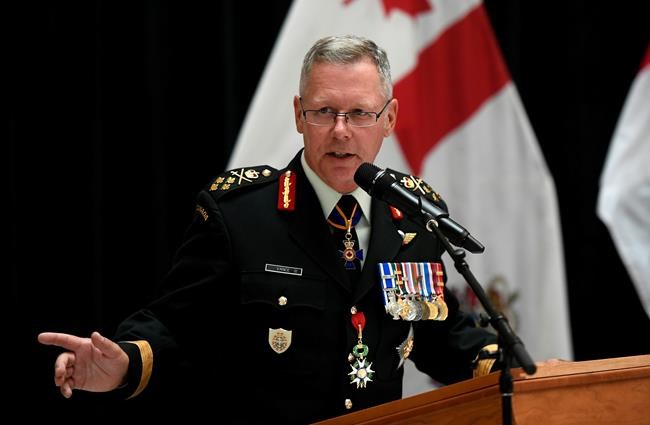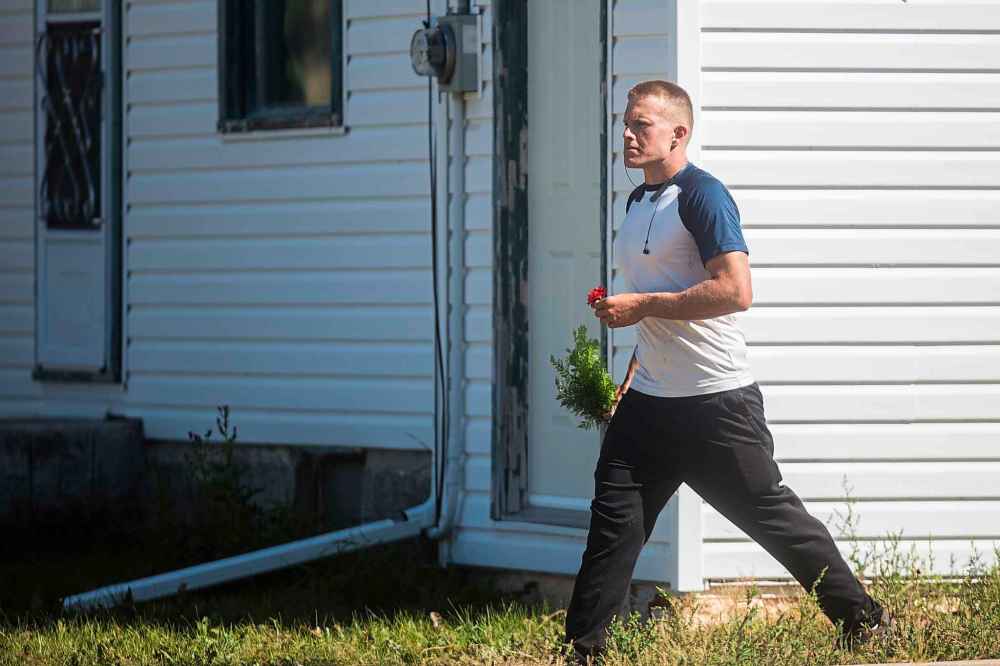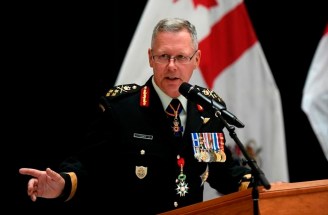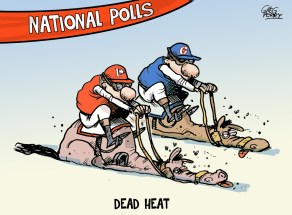Military aware of Winnipeg soldier’s neo-Nazi ‘utterances’ since April, Canada’s top general says
Read this article for free:
or
Already have an account? Log in here »
To continue reading, please subscribe:
Monthly Digital Subscription
$1 per week for 24 weeks*
- Enjoy unlimited reading on winnipegfreepress.com
- Read the E-Edition, our digital replica newspaper
- Access News Break, our award-winning app
- Play interactive puzzles
*Billed as $4 plus GST every four weeks. Offer only available to new and qualified returning subscribers. Cancel any time.
Read unlimited articles for free today:
or
Already have an account? Log in here »
Hey there, time traveller!
This article was published 22/08/2019 (2020 days ago), so information in it may no longer be current.
Canada’s top general has disclosed the military has been tracking a Manitoba solider for months, after a Free Press exclusive report uncovered his links to a neo-Nazi group.
Gen. Jonathan Vance, the chief of defence staff, told reporters Thursday that the Canadian Forces national counter-intelligence unit has been involved in monitoring Master Cpl. Patrik Mathews, a 26-year-old reservist.
RCMP briefly put Mathews in custody Monday night during a raid at his Beausejour home, where they seized several weapons. Police haven’t said whether the weapons have been — or will be — returned to him. He has not been charged with any crime.

The military has now given conflicting accounts of when it first became aware of Mathews’ extremist views, leading to questions about the extent to which it is proactively weeding proponents of hate from its ranks.
According to Vance, Mathews was on the military’s radar in April, roughly four months before a Free Press investigation revealed he was an active recruiter for a neo-Nazi paramilitary organization that represents the most violent fringes of the far-right hate movement.
“Utterances” made by Mathews reportedly raised red flags and he had his first contact with his chain of command in April. By July, Vance said, he was “well and truly under investigation.”
“It was not unknown and not missed,” Vance said. “I’m not doing a victory lap on this. To tell you the truth, it saddens me that this has even happened.”
It was the first time the Canadian Armed Forces has publicly said when it began its investigation into Mathews’ conduct.
However, Vance’s comments are directly contradicted by what Commander 38 Canadian Brigades Group Col. Gwen Bourque told reporters Tuesday during the military’s first news conference on the case.
While Vance said Mathews’ views came to the Forces’ attention in April, Bourque said the military was unaware of any issues with the combat engineer in May.
“The last time he worked was actually in May,” she said. “He only paraded twice in May with his unit, which is a total of about six hours approximately, and at this time we weren’t aware of any of these issues.”
During the press conference, Bourque would not say when the investigation into Mathews began.
It’s not clear to what extent — if at all — the military knew of Mathews’ involvement in The Base, a neo-Nazi paramilitary group actively recruiting in Winnipeg and across Canada.

“We have since, as new information comes to light, including that great report in the Winnipeg Free Press — great reporting — as new information comes to light from security partners, media or otherwise, we react accordingly,” Vance said.
Mathews remains an active member of the Forces pending the outcome of an investigation into his extremist activity. Vance also revealed Thursday that Mathews requested a release from his duties shortly after he was spoken to by his chain of command in April.
Rory Fowler, an expert in military law, says it’s likely the Forces has no way under its code of conduct to punish Mathews because reservists aren’t subject to the same strict guidelines as regular, full-time soldiers.
But that won’t stop the military from dismissing Mathews from his duties through an administrative process if need be, said Fowler, a lawyer who spent 27 years in the Forces and retired as a lieutenant-colonel.
“If he’s not in uniform, if he’s not conducting training or activities for the Canadian Forces, if he’s not being paid for his service, and if he’s not on a defence establishment, he’s not subject to the code of service discipline,” he said.
“There’s a compelling argument they wouldn’t have jurisdiction to try him for that because they didn’t have jurisdiction while he was doing it.”
Mathews has been a Forces member since 2010.
Even if Mathews escapes punishment under a disciplinary investigation, Fowler said the military would be well within its rights to take administrative action.
“What they would have jurisdiction to do is kick him out of the Canadian Forces for no other reason than it looks bad,” he said. “They’ve kicked people out of the Canadian Forces for less.”
As a part-time member of the Canadian Army Reserves, Mathews was likely serving “one evening a week, maybe two evenings a week, one weekend a month” between September and May, Fowler said.
Mathews is scheduled to return to work next month. If the disciplinary investigation hasn’t been completed by then, the military has several options it can exercise to keep him from returning to his former duties, Fowler said.

“They could take steps to restrict his access to certain things like weapons, explosives, etc. They could direct him that he’s not going to report to the army. They could even go so far as to relieve him from his military duties,” he said.
The RCMP has declined comment about the basis for seizing Mathews’ firearms and whether search warrants were executed at other properties connected to him.
Winnipeg defence lawyer Joshua Rogala said the public won’t know the reason until the search warrant documentation becomes public record.
Rogala said the most likely explanation is police applied for a search warrant, which granted them the right to seize Mathews’ weapons, on the basis they felt he posed a safety risk, either to himself or the public.
The Crown now has 30 days to file a court notice seeking a permanent weapons forfeiture. In that case, a judge could also impose a weapons ban of up to five years, Rogala said.
ryan.thorpe@freepress.mb.ca
Twitter: @rk_thorpe

Ryan Thorpe
Reporter
Ryan Thorpe likes the pace of daily news, the feeling of a broadsheet in his hands and the stress of never-ending deadlines hanging over his head.
Our newsroom depends on a growing audience of readers to power our journalism. If you are not a paid reader, please consider becoming a subscriber.
Our newsroom depends on its audience of readers to power our journalism. Thank you for your support.




















